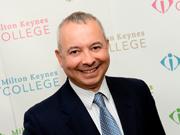Maths matters

Maths matters. The OECD’s PISA survey last year showed the UK lagging way behind Shanghai, Singapore, South Korea and Japan in terms of the standard of maths of our 15-year-olds. Without numeracy people struggle. The highest wage earners tend to be the most numerate.
Indeed an argument can be made that numeracy is one of the building blocks of active citizenship. Therefore it must be right that the government have demanded colleges enrol all those 16-year-olds who achieve a D grade at GCSE at their first attempt on to a new GCSE course when they start at College. The expectation is that they achieve at least a grade C within two further years of study. It would seem that in future, failure to enrol any such student on another GCSE programme will result in dramatic clawback of funding. In fact the wording is so ambiguous it could even mean failure to achieve a C grade after two further years study will result in such clawback. If that is the case it would seem that FE is once again being used as a whipping boy for the education system’s inherent flaws.
However there are many reasons why this course of action is not necessarily the solution to the UK’s innumeracy problems. In fact it could be the very worst thing to do to young people who have just spent the previous 11 years failing at maths. It is not that many of them are intrinsically incapable of understanding maths. It’s simply that the way the curriculum is taught does nothing to encourage their understanding. The mental shutters go up and the blinkers go on and they switch off. The maths teacher struggling to engage their class of 30 then focuses on those likely to creep over the C grade boundary.
But it doesn’t have to be this way. Alex Bellos in his books on maths, Alex’s Adventures in Numberland and Alex through the Looking Glass show how other cultures make maths fun. For example in Japan abacus clubs are enormously popular. Local, regional and national competitions are held where people compete to add up large numbers in very short periods of time using abacuses. Even more impressively the more advanced competitors don’t even use a physical abacus. They hold a mental image of the abacus in their heads to do the computation. Every Japanese child is exposed to the opportunities these clubs offer to do maths in a fun way. For them joining an abacus club is like going to the cubs, brownies, guides or scouts.
Meanwhile closer to home in Plymouth, the enterprising Principal of Plymouth College of Art, Andrew Brewerton, has set up a free school where creativity is the medium through which everything is taught. In this school five year olds use dance to help them understand the concept of number.
What we need to do is rethink the whole approach to teaching maths. Why does the GCSE have a calculator and non-calculator paper? In the real world we all use calculators. Why are we teaching maths in a way designed to progress people up the academic ladder rather than teach maths as a way to solve everyday problems? For maths is simply a language which can be used to understand the world we live in a little better. As Conrad Wolfman argues ‘At its heart, maths is the world’s most successful system of problem solving. The point is to take real things we want to work out and apply, or invent, maths to get the answer. One example involves four steps: define the question, translate it to mathematical formulation of that question, calculate or compute the answer in maths-speak and then translate it back to answer your original question, verifying that it really does.
Now most experienced lecturers in FE understand that simply asking young people to ‘have another go’ is a rather sterile process of pushing boulders uphill. They understand that other approaches and courses, focused on problem solving, might spark often long dampened instincts we all do have for maths. Most people over the age of 20 have forgotten much of their GCSE maths. Yet most people will be using maths all the time in their daily lives.
This disconnect between content, approach and style is at the heart of why so many young people fail to reach grade C in maths GCSE by the age of 16. We are teaching young people the wrong sort of maths. Even in Ancient Greece maths was split into two types – calculating for the artisan classes and maths as a way of better understanding the world and enhancing logical thought for the upper classes. Plato believed his academicians should study the latter form of maths for the first 10 years as it enabled them to grasp a new language with which to describe abstract processes and principles.
We need a new maths. A maths that switches people on to understanding a language for problem solving not a rote learnt set of rules for calculating better. The current GCSE syllabus needs adapting for the post 16 world of an FE College. The maths lecturers and vocational subject specialists need to be trusted more to put young people on the right maths courses for each individual. For maths is too important to all our lives to be left to the politicians to decide who should do what when.
Nick Isles is deputy principal of Milton Keynes College – follow him on Twitter at @dpmkcollege












Responses